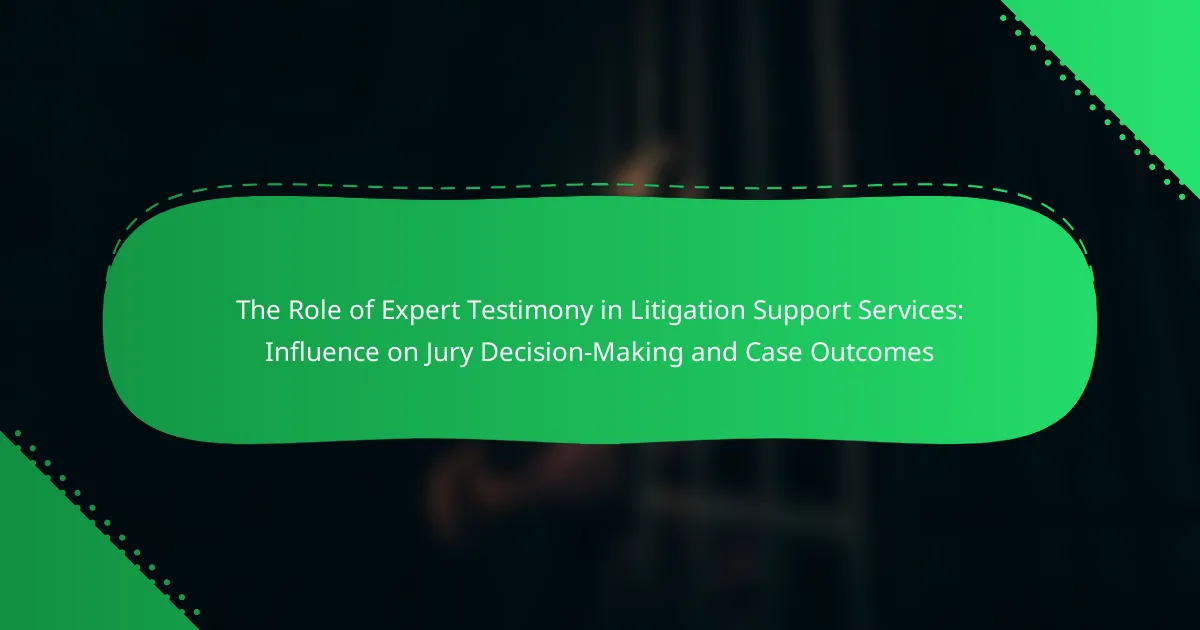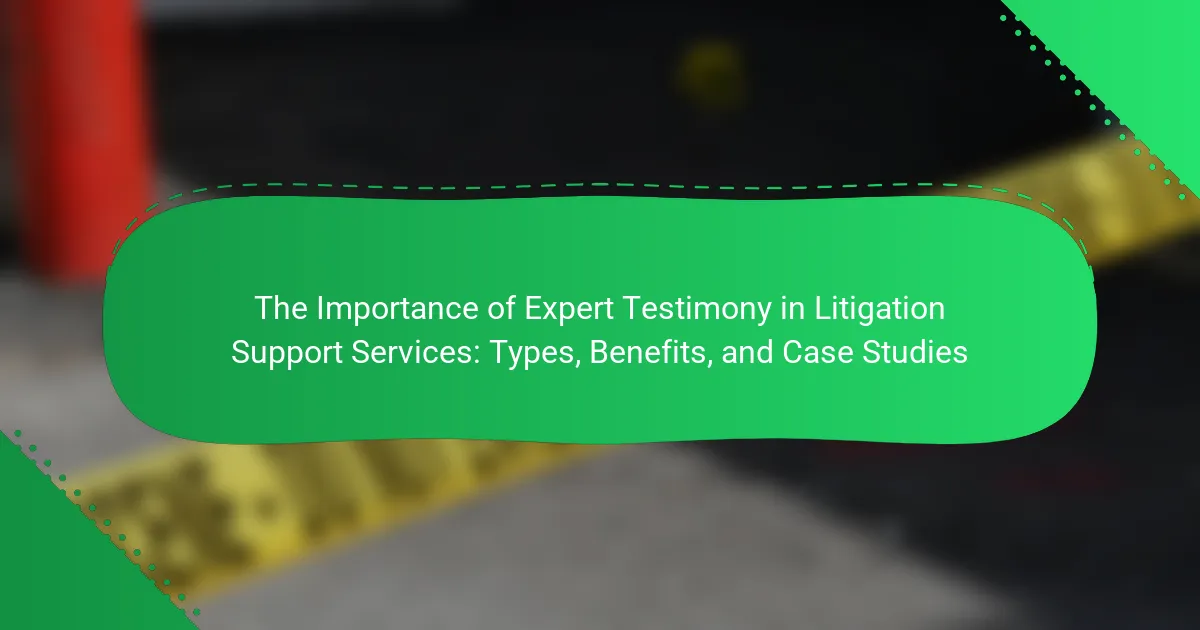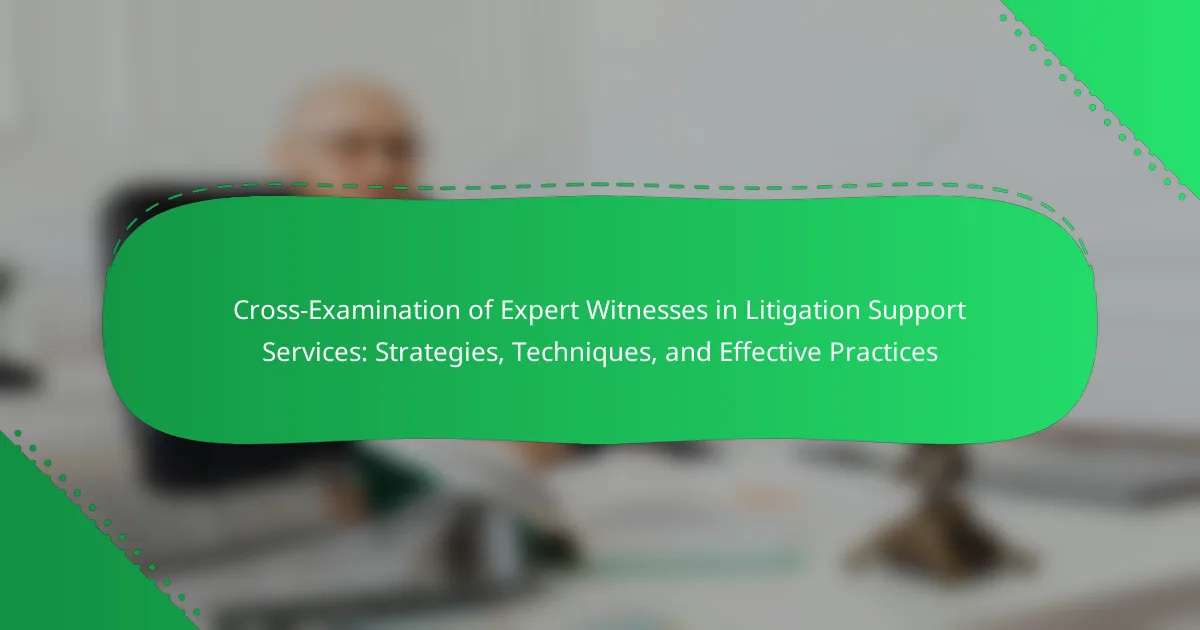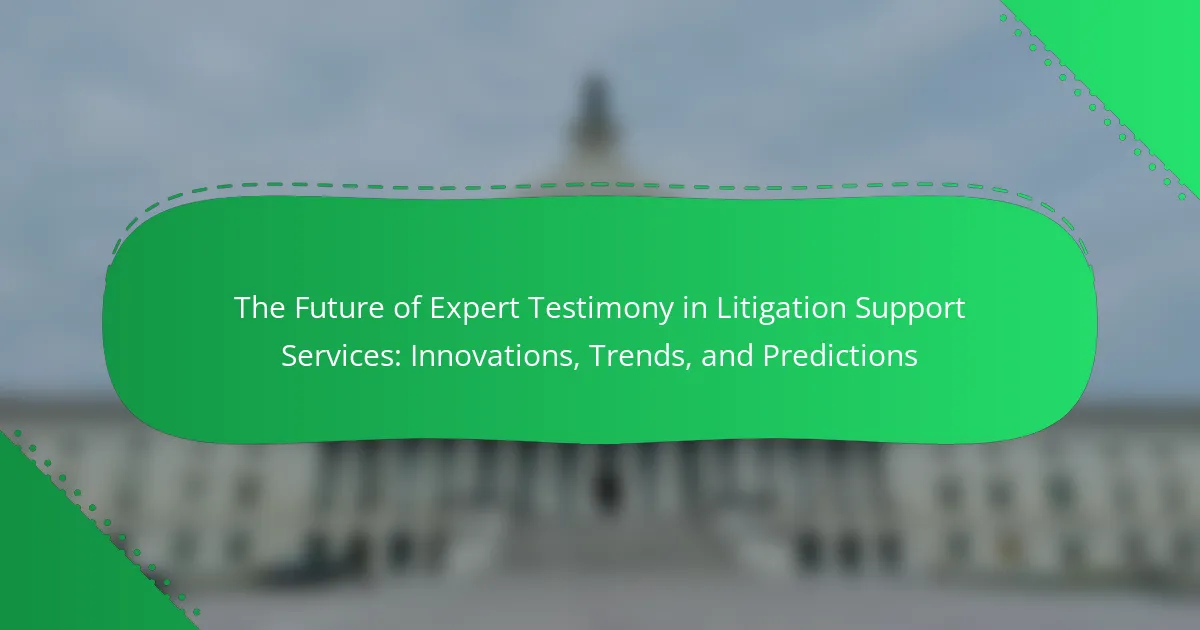Expert testimony is a vital component of litigation support services, providing specialized knowledge that aids in understanding complex legal issues. This testimony clarifies technical details for jurors, significantly influencing their decision-making and the overall credibility of a case. The process of integrating expert testimony involves identifying the need for experts, selecting qualified individuals, collaborating on case details, and preparing clear reports that summarize findings. Studies indicate that jurors often rely on credible expert opinions, which can impact case outcomes by swaying verdicts in favor of the presenting party. The effectiveness of expert testimony hinges on the expert’s credibility and presentation, underscoring its importance in shaping legal decisions.
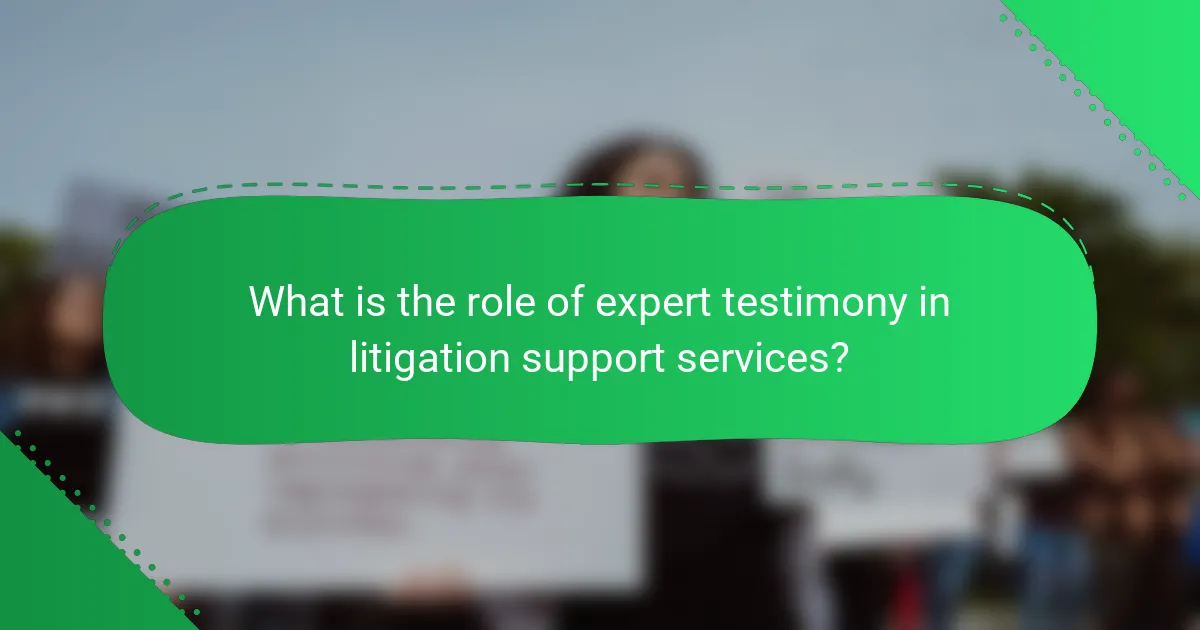
What is the Role of Expert Testimony in Litigation Support Services?
Expert testimony plays a crucial role in litigation support services. It provides specialized knowledge that aids in understanding complex issues. Experts clarify technical details that may be beyond the comprehension of the average juror. Their insights can significantly influence jury decision-making. Expert testimony can also enhance the credibility of a case. Studies show that jurors often rely on expert opinions when deliberating. This reliance can lead to more favorable outcomes for the party presenting the expert. Overall, expert testimony is integral to effective litigation support.
How does expert testimony influence jury decision-making?
Expert testimony significantly influences jury decision-making by providing specialized knowledge that jurors may lack. This testimony helps clarify complex issues related to the case. Jurors often rely on expert opinions to understand technical evidence. Studies show that jurors are more likely to trust information presented by credible experts. For example, research by the National Center for State Courts indicates that expert testimony can sway jury perceptions of liability. This influence is particularly strong when the expert is well-respected in their field. Furthermore, expert testimony can frame the narrative of the case, guiding jurors toward specific interpretations of evidence. Overall, expert testimony plays a crucial role in shaping jury outcomes.
What factors contribute to the effectiveness of expert testimony?
The effectiveness of expert testimony is influenced by several key factors. Credibility is paramount; experts must possess relevant qualifications and experience. Clear communication enhances understanding; experts should present complex information in an accessible manner. The relevance of the testimony to the case is critical; it must directly address the issues at hand. Objectivity is essential; experts should remain impartial and avoid bias. The ability to withstand cross-examination strengthens the testimony; experts must be prepared to defend their opinions rigorously. Empirical support for their conclusions adds weight; expert opinions should be backed by data or established research. These factors collectively ensure that expert testimony is persuasive and impactful in litigation contexts.
How does the credibility of an expert impact jury perceptions?
The credibility of an expert significantly influences jury perceptions. Credible experts are perceived as more trustworthy and knowledgeable. This perception can enhance the weight of their testimony. Jurors are more likely to accept evidence from experts with strong credentials and relevant experience. Studies show that jurors often rely on expert opinions to make informed decisions. For instance, a study published in the Journal of Forensic Sciences demonstrates that jurors favor testimony from experts with recognized qualifications. Additionally, the presence of a credible expert can lead to more favorable outcomes for the party they represent. Thus, expert credibility plays a critical role in shaping jury beliefs and decisions.
What are the key types of expert testimony used in litigation?
The key types of expert testimony used in litigation are scientific, technical, and specialized knowledge testimonies. Scientific expert testimony involves evidence based on scientific methods and principles. This type of testimony is often used in cases involving forensic science, medical malpractice, or environmental issues. Technical expert testimony provides insights based on specific technical knowledge or skills. This is common in engineering, computer science, and product liability cases. Specialized knowledge expert testimony encompasses areas requiring specific expertise, such as financial analysis or psychological evaluation. These expert testimonies are crucial in helping juries understand complex issues and make informed decisions.
What distinguishes forensic experts from other types of experts?
Forensic experts are distinguished by their application of scientific principles to legal matters. They analyze evidence related to criminal cases, civil disputes, or other legal issues. Their work often involves the collection, preservation, and examination of physical evidence. Forensic experts provide objective findings that can be presented in court. Unlike other experts, they must adhere to strict legal standards and protocols. Their testimony often carries significant weight in influencing jury decisions. Forensic disciplines include fields such as forensic science, forensic psychology, and forensic accounting. These unique attributes set them apart from other types of experts who may not operate within the legal framework.
How do expert witnesses prepare for their roles in court?
Expert witnesses prepare for their roles in court by thoroughly reviewing case materials. They analyze documents, evidence, and reports relevant to the case. This ensures they understand the context and specifics of the matter at hand. They often consult with legal teams to clarify expectations and objectives. Expert witnesses may also conduct independent research to bolster their knowledge. They practice their testimony to ensure clarity and confidence. Additionally, they stay updated on relevant laws and standards in their field. This preparation enhances their credibility and effectiveness during court proceedings.
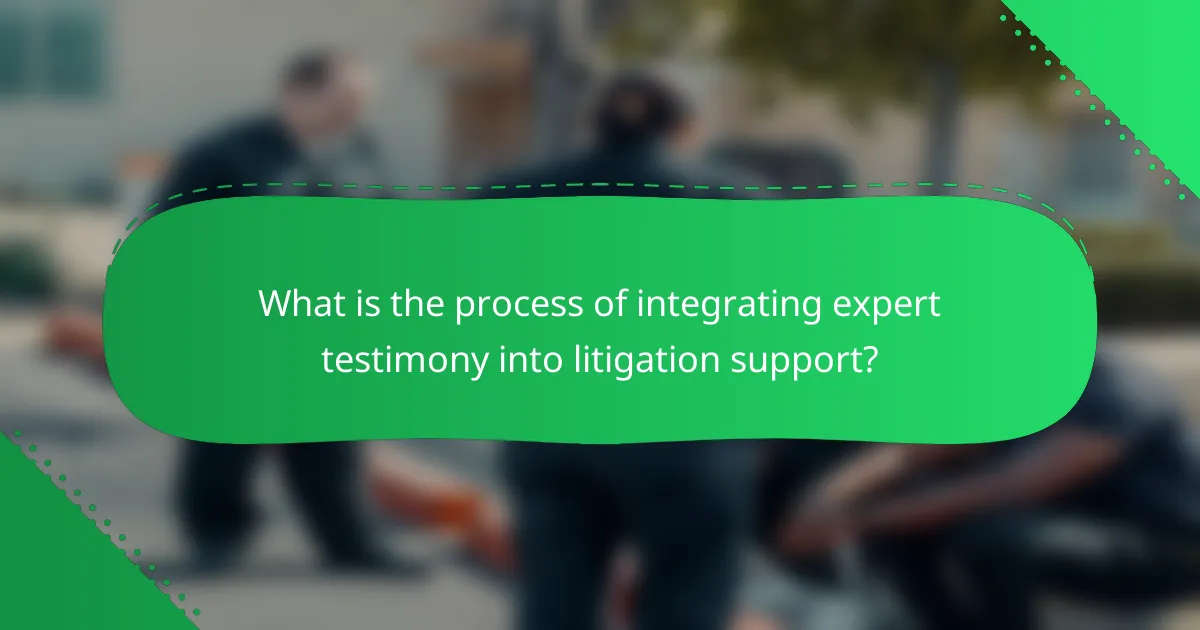
What is the process of integrating expert testimony into litigation support?
The process of integrating expert testimony into litigation support involves several key steps. First, attorneys identify the need for expert testimony based on case requirements. Next, they select qualified experts with relevant expertise and credentials. After selection, attorneys collaborate with experts to develop a clear understanding of the case’s technical aspects. This collaboration includes sharing case materials and discussing critical issues.
Once the expert is informed, they analyze the evidence and formulate opinions. These opinions must be articulated clearly for legal proceedings. The expert then prepares a report summarizing findings and conclusions. This report is essential for supporting the legal argument.
Finally, the expert may be called to testify in court. Their testimony helps clarify complex issues for the jury. This process ensures that expert insights are effectively integrated into litigation support.
How do attorneys select the right expert witness for a case?
Attorneys select the right expert witness by evaluating their qualifications and relevance to the case. They consider the expert’s education, experience, and specific knowledge related to the case’s subject matter. Attorneys also assess the expert’s ability to communicate complex information clearly. They may review past testimonies and consult peer recommendations for credibility. The expert’s availability and willingness to testify are also crucial factors. Ultimately, the chosen expert should enhance the case’s persuasive power in front of a jury. A well-selected expert can significantly influence jury decision-making and case outcomes.
What criteria are used to evaluate potential expert witnesses?
Potential expert witnesses are evaluated based on several key criteria. These criteria include qualifications, experience, and credibility. Qualifications refer to the expert’s educational background and relevant certifications. Experience encompasses the expert’s practical work in the field and familiarity with the specific subject matter. Credibility involves the expert’s reputation and reliability in the eyes of the court and legal professionals. Additionally, the ability to communicate complex information clearly is essential. Courts often consider the expert’s prior testimony and any publications as part of the evaluation process. These factors collectively ensure that the expert can provide valuable insights that influence jury decision-making and case outcomes.
How does the expert’s background influence their selection?
An expert’s background significantly influences their selection in litigation support services. Their educational qualifications establish credibility and expertise in a specific field. Relevant professional experience enhances their ability to provide insightful analysis. Specializations within their discipline can make them more suitable for particular cases. The reputation they hold in their industry can impact the perception of their testimony. Past involvement in similar cases can indicate their familiarity with the legal context. Jurors often relate to experts with relatable backgrounds, which can sway decision-making. Therefore, an expert’s comprehensive background shapes their effectiveness and acceptance in court.
What role does expert testimony play during trial proceedings?
Expert testimony plays a crucial role during trial proceedings. It provides specialized knowledge to help the court understand complex issues. Experts clarify technical details that are beyond the average juror’s understanding. Their insights can influence jury perceptions and decisions. The credibility of expert witnesses can significantly impact case outcomes. Research shows that juries often rely on expert testimony when making determinations. Effective expert testimony can lead to favorable verdicts for the presenting party. In many cases, the presence of an expert can sway the jury’s opinion.
How do expert witnesses present their findings to the jury?
Expert witnesses present their findings to the jury through clear and concise explanations. They use visual aids, such as charts and diagrams, to enhance understanding. Expert witnesses often break down complex information into simpler terms. They provide context for their findings, explaining relevance to the case. This helps jurors grasp the significance of the evidence presented. Additionally, expert witnesses may engage in direct examination by attorneys. They answer questions to clarify their expertise and findings. Their goal is to establish credibility and assist the jury in decision-making. This method of presentation is crucial for influencing jury perceptions and case outcomes.
What are common challenges faced by expert witnesses in court?
Expert witnesses face several common challenges in court. One major challenge is the complexity of legal terminology. Expert witnesses must communicate technical information clearly to juries. They also encounter difficulties when their credibility is questioned. Opposing counsel may attempt to undermine their qualifications. Additionally, expert witnesses often deal with time constraints. Preparing for court can be demanding, requiring extensive research and documentation. Another challenge is the potential for bias. Experts must remain objective despite the pressures of the case. Finally, they may struggle with the emotional aspects of testifying. The courtroom environment can be stressful and intimidating.
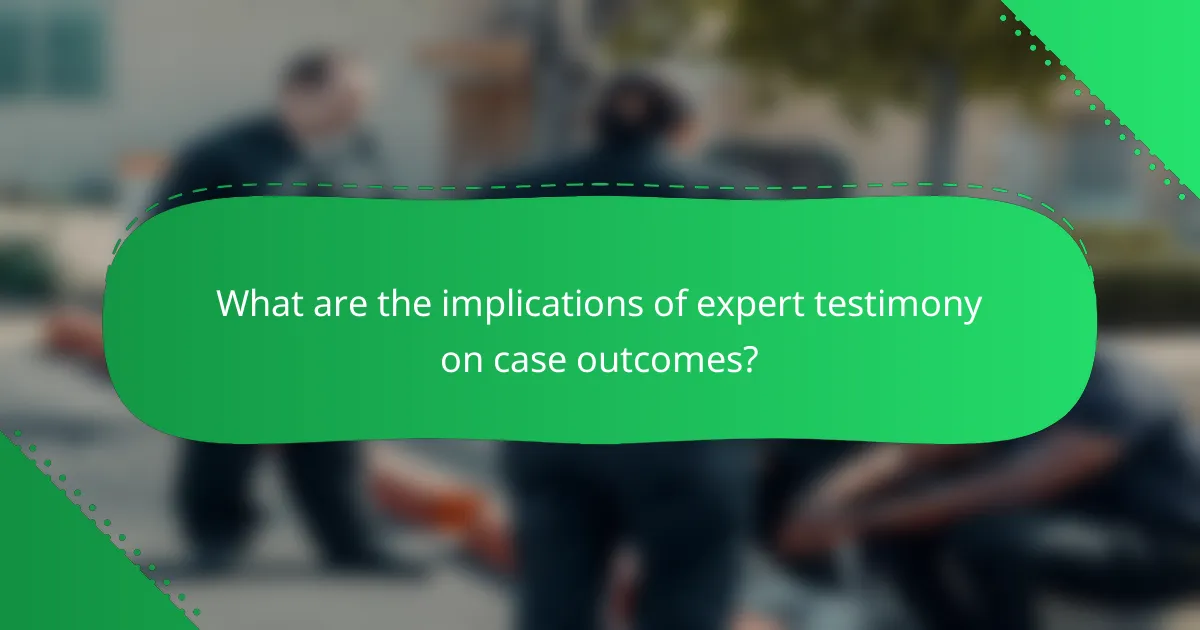
What are the implications of expert testimony on case outcomes?
Expert testimony significantly influences case outcomes. It can clarify complex issues for the jury. Jurors often rely on expert opinions to make informed decisions. Studies show that juries are more likely to be swayed by credible expert testimony. For example, a study published in the Journal of Empirical Legal Studies found that expert witnesses can affect the verdict in over 70% of cases. The credibility of the expert also plays a crucial role. Well-respected experts are more persuasive. Conversely, poorly presented expert testimony can undermine a case. Thus, the implications of expert testimony are profound in shaping legal decisions.
How does expert testimony affect jury deliberation processes?
Expert testimony significantly influences jury deliberation processes. It provides jurors with specialized knowledge that aids their understanding of complex evidence. Jurors often rely on expert opinions to interpret technical information. This reliance can shape their perceptions of credibility and reliability in the case. Studies indicate that jurors may give more weight to expert testimony than to layperson testimony. For instance, a survey by the National Center for State Courts found that 75% of jurors reported that expert testimony helped them reach a verdict. Furthermore, expert witnesses can clarify uncertainties and reduce biases during deliberation. Their presence may lead to more informed discussions among jurors. This ultimately affects the outcome of the trial.
What strategies can experts use to enhance their persuasiveness?
Experts can enhance their persuasiveness by employing strategies such as building credibility, using clear communication, and engaging emotionally with the audience. Building credibility involves demonstrating expertise through qualifications and relevant experience. Clear communication includes simplifying complex concepts and avoiding jargon. Engaging emotionally can be achieved by telling relatable stories that connect with the audience. Research indicates that jurors are more likely to be influenced by experts who establish trust and rapport. A study published in the Journal of Legal Studies found that credible experts significantly impact jury decision-making.
How do jurors interpret complex expert information?
Jurors interpret complex expert information through a process of simplification and contextualization. They rely on their own experiences and knowledge to make sense of technical details. Jurors often seek clarity in the expert’s presentation. Visual aids and clear language can enhance understanding. Studies show that jurors may struggle with technical jargon. They benefit from expert testimony that is relatable and straightforward. Research indicates that jurors favor experts who communicate effectively. This ability to distill complex information influences their decision-making significantly.
What best practices should be followed for effective expert testimony?
Effective expert testimony should be clear, concise, and well-organized. Experts must communicate complex information in an understandable manner. They should avoid jargon and explain technical terms when necessary. Preparation is crucial; experts should thoroughly understand the case and the relevant materials. They must also anticipate opposing questions and prepare responses. Credibility is essential; experts should present qualifications and relevant experience. Engaging with the jury is important; experts should maintain eye contact and use appropriate body language. Finally, experts should stay objective and avoid expressing personal opinions unrelated to their expertise. These practices enhance the effectiveness of expert testimony and positively influence jury decision-making.
How can expert witnesses maintain objectivity and credibility?
Expert witnesses can maintain objectivity and credibility by adhering to rigorous standards of professionalism. They should base their opinions on reliable data and established methodologies. This approach ensures their testimony is scientifically valid. Additionally, expert witnesses must disclose any potential conflicts of interest. Transparency in their qualifications and experience further enhances their credibility. They should avoid advocacy for either party in a case. This impartial stance reinforces their role as objective advisors. Maintaining consistent communication with legal teams also helps clarify expectations and maintain focus on facts. Overall, these practices contribute to the integrity of their testimony in litigation.
What are the common pitfalls to avoid when presenting expert testimony?
Common pitfalls to avoid when presenting expert testimony include lack of clarity. Experts must communicate complex information simply. Overly technical language can confuse jurors. Another pitfall is failing to establish credibility. Experts should highlight their qualifications and relevant experience. Inconsistency in testimony can also undermine trust. Experts must ensure their statements align with established facts. Additionally, being unprepared for cross-examination is risky. Experts should anticipate challenging questions and rehearse responses. Finally, emotional bias can affect objectivity. Experts must remain neutral and focus on factual evidence.
The main entity of this article is expert testimony within litigation support services. The article outlines the critical role expert testimony plays in influencing jury decision-making and case outcomes by providing specialized knowledge that clarifies complex issues. It discusses factors contributing to the effectiveness of expert testimony, including credibility, clear communication, and relevance. Additionally, the article examines the types of expert testimony, the preparation process for expert witnesses, and common challenges faced during court proceedings. The implications of expert testimony on jury deliberation and strategies for enhancing persuasiveness are also explored, providing a comprehensive overview of its significance in legal contexts.
